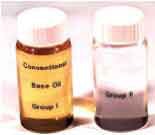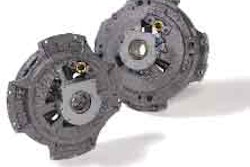Proper lube use ensures warranty protection
Equipment makers set the lube laws of the land
Because the major drivetrain component manufacturers are the ones that approve warranty repairs for their products, they essentially hold all the cards when it comes to determining what lubes can be used and the length of change intervals for parts under warranty. Lubricant requirements were created in response to truck owners’ high expectations for component reliability and life, as well as the warranty that goes along with high-quality components. That’s why component makers insist on the development of lubes that will protect their components during their extended lives and also meet fleet requirements for extended intervals without creating premature wear or failure.
 Group III and IV oils have better viscosity characteristics than most basic Group I and Group II base oils, meaning they thin out less at high temperatures and do not get as viscous in frigid conditions.
Group III and IV oils have better viscosity characteristics than most basic Group I and Group II base oils, meaning they thin out less at high temperatures and do not get as viscous in frigid conditions.Rick Muth, manager of lubricants for Eaton Corp. and the Roadranger organization, says that because of the design and development work that Eaton and Dana must perform constantly to meet the requirements of ever-changing operating environments, the companies had to take charge of the lubricants that would be permitted for use in their transmissions and axles.
The standard is not arbitrary, but is based on ensuring full protection of the component. “Lubricants that do not meet the specifications may very well have a negative impact on component performance,” Muth says. This occurs primarily in the areas of seal performance, synchronizer shifting performance, gear wear and bearing wear, all of which can lead to gear noise or, in the worst case, gear failures.
A key characteristic of an approved lubricant is its ability to perform well over extreme temperature ranges that may go from minus 40 degrees Fahrenheit to as high as 250 degrees Fahrenheit. “We simply cannot tolerate a heavy thickening at cold temperatures for fluids moving through oil coolers and lube orifices, nor can we have any heavy varnishing and sludge formation when operating at sustained high temperatures,” Muth says.
Picking lubes
When selecting lubricants, one critical aspect is their base oil. Both Eaton and Roadranger, as well as ArvinMeritor, have objective performance tests that determine approval or disapproval of a lube and how it handles 500,000+-mile change intervals they have adopted for their components in linehaul trucks.
ArvinMeritor treats both synthetic and semi-synthetic oils as extended-drain oils as long as they are tested and approved under the SAE J2360 performance specification. All approved lubes for ZF Meritor manual transmissions and Freedomline automated transmissions are composed of fully synthetic Group IV oils, says Bruce McGlone, ArvinMeritor senior chemist. A Group IV oil is a fully synthetic base oil that has not been extracted from the earth and refined; when used in gear oils, they have been polymerized from monomers in a chemical plant.
Additional field-testing by the oil supplier is required for the extended-drain approval of gear oils that are not fully synthetic but have been approved under SAE J2360. “Several of ArvinMeritor’s approved extended-drain gear oils contain Group III base oils,” McGlone says.
Group III base oils have been exposed to refining techniques such as solvent refining, hydrotreating, isodewaxing and hydrofinishing to improve the base oil’s properties beyond what has been used to refine Group II base oils.
For Eaton transmissions and Dana drive axles, the key requirement for the extended component warranty is the use of lubricants that have been approved to the PS 164 Rev7 specification for transmissions or the SHAES 256 RevC specification for axles. “No suppliers have been approved with a semi-synthetic lube,” Muth says. The issue isn’t synthetics versus nonsynthetics, but more of a concern that only approved lubricants should be used for all Roadranger drivetrain components.
Many drivetrain components under warranty require synthetic lubes.











